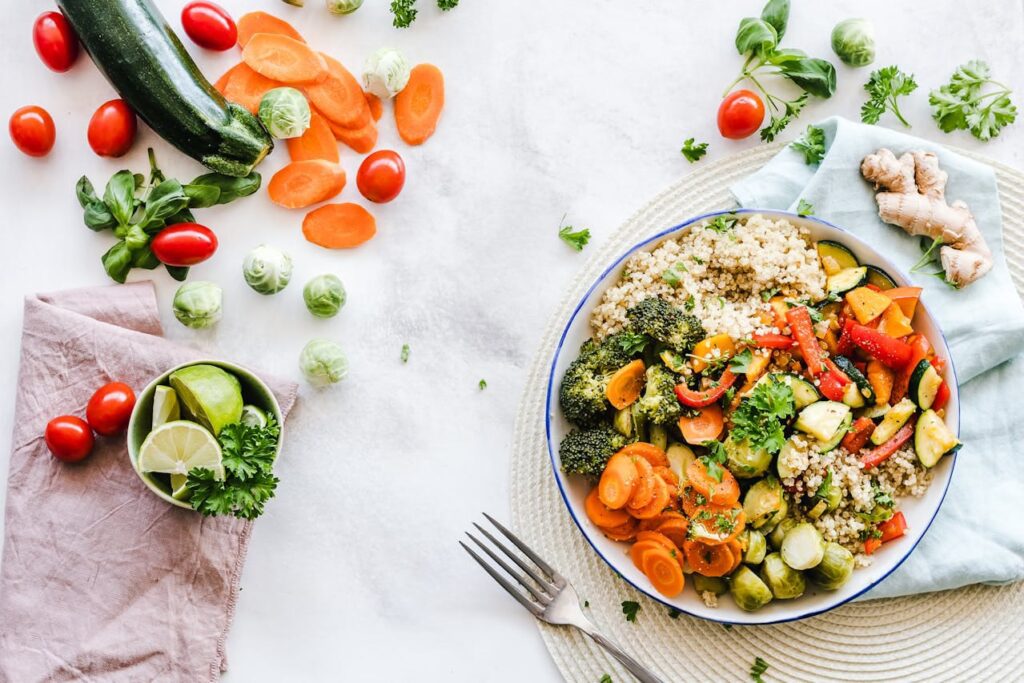
Ayurveda and Yoga, two ancient Indian sciences, go hand-in-hand when it comes to achieving optimal health and well-being. While Yoga brings balance through physical movement and breath, Ayurveda guides us through the right food choices and lifestyle habits. If you are on a journey to a healthier lifestyle through yoga, then aligning your eating habits with Ayurvedic principles can amplify the benefits. Here are ten Ayurvedic diet principles (Ahar Sutras) that not only support a healthy body but also a calm and focused mind.
1. Eat According to Your Biological Clock
Ayurveda emphasizes eating when you’re truly hungry, not just based on the time on the clock. This principle encourages us to be in tune with our body’s natural signals, which aligns with Yogic mindfulness. Ignoring these cues can lead to digestive issues like gas and acidity.
2. Maintain Portion Control
One-third of your stomach should be filled with food, one-third with water, and one-third should be left empty for air and digestion. This simple rule helps prevent overeating, promoting better digestion and a balanced metabolism.
3. Avoid Overeating
Eating more than your digestive capacity can lead to obesity, high blood pressure, diabetes, and other lifestyle disorders. Ayurveda and Yoga both advocate for moderation as the key to longevity and health.
4. Eat in a Calm Environment
Your surroundings play a vital role in digestion. Eating in a pleasant, clean, and quiet place helps your body absorb nutrients better. Avoid watching screens or indulging in stressful conversations during meals.
5. Include Desi Cow Ghee in Your Diet
A teaspoon of clarified butter (ghee) made from Indian desi cow milk is highly recommended in Ayurveda. It enhances digestion, supports joint health, and nourishes the brain.
6. Practice Mindful Eating
Yoga teaches us to be present in every moment—including mealtime. Avoid distractions, chew thoroughly, and savor your food. This enhances digestion and reduces overeating.
7. Prefer Fresh Meals Over Packaged Foods
Freshly cooked meals carry prana (life force), while frozen or processed foods are devoid of vital energy. Eating freshly prepared meals supports vitality, much like regular yoga practice does for your body.
8. Weekly Fasting for Detox
A day of fasting each week allows your digestive system to rest and detoxify. You can choose a complete fast or opt for light liquids like fruit juices. This aids in cleansing both the body and mind.
9. Choose a Balanced Over a Rich Diet
A rich diet overloaded with fats and sugars may lead to organ damage over time. Ayurveda recommends a simple, wholesome, and nutritious diet that’s light yet satisfying.
10. Don’t Eat Right Before or After Yoga
Allow your body to digest before and after your yoga session. A small quantity of milk or a teaspoon of butter is sufficient if you’re slightly hungry before practice. Avoid heavy meals right before yoga.
Benefits of Following Ayurvedic Diet with Yoga
When combined with Yoga, an Ayurvedic diet enhances physical flexibility, mental clarity, emotional stability, and spiritual growth. This synergy improves digestion, immunity, energy levels, and inner peace.
Final Thought
Ayurveda and Yoga both preach balance and simplicity. “Eat to live, not live to eat.” Let your meals be an act of self-care, just like your Yoga practice.
Frequently Asked Questions (FAQs):
1. Can I practice yoga right after eating a meal?
No, it’s best to wait at least 2 hours after a meal before starting your yoga practice.
2. Is ghee suitable for everyone?
Desi cow ghee is generally beneficial, but if you have dietary restrictions, consult an Ayurvedic doctor first.
3. Why is fasting recommended in Ayurveda?
Fasting helps in detoxifying the body and improving digestive fire (Agni), which supports better metabolism.
4. Are all types of packaged food bad?
Ayurveda advises against processed and packaged foods as they lack prana (life energy). Fresh is always better.
5. How does mindful eating benefit me?
Mindful eating improves digestion, prevents overeating, and fosters a deeper connection with your food and body.




0 Comments